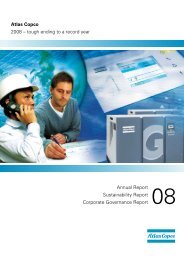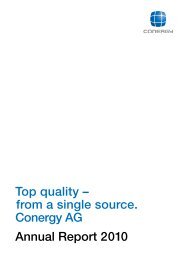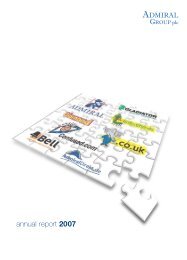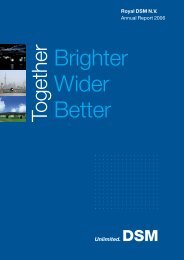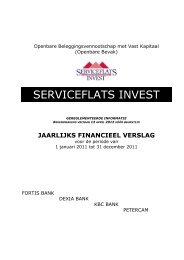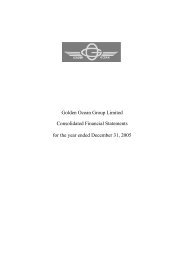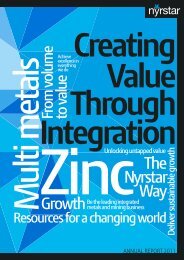Today, Wavin - Jaarverslag.com
Today, Wavin - Jaarverslag.com
Today, Wavin - Jaarverslag.com
You also want an ePaper? Increase the reach of your titles
YUMPU automatically turns print PDFs into web optimized ePapers that Google loves.
<strong>Wavin</strong> Annual Report 2010 | page 803. Significant accounting policies(a) Basis of consolidation(i) SubsidiariesSubsidiaries are those enterprises controlled by the Company. Control exists when the Company has the power, directly orindirectly, to govern the fi nancial and operating policies of an entity so as to obtain benefi ts from its activities. In assessingcontrol, potential voting rights that are presently exercisable are taken into account. The fi nancial statements of subsidiariesare included in the consolidated fi nancial statements from the date that control <strong>com</strong>mences until the date that control ceases.The accounting policies of subsidiaries have been changed when necessary to align them with the policies adopted bythe Group. The share of third parties in the result and equity of the consolidated subsidiaries are reported separately.See page 145 for the outline of the <strong>com</strong>pany’s principal direct and indirect participations.(ii) AssociatesAssociates are those enterprises in which the Group has signifi cant infl uence, but not control, over the fi nancial and operatingpolicies. The consolidated fi nancial statements include the Group’s share of the total recognised gains and losses ofassociates on an equity accounted basis, from the date that signifi cant infl uence <strong>com</strong>mences until the date that signifi cantinfl uence ceases. When the Group’s share of losses exceeds its interest in an associate, the Group’s carrying amount isreduced to nil and recognition of further losses is discontinued except to the extent that the Group has incurred legal orconstructive obligations or made payments on behalf of an associate.(iii) Transactions eliminated on consolidationIntragroup balances and transactions, and any unrealised gains arising from intra-group transactions, are eliminated inpreparing the consolidated fi nancial statements. Unrealised net gains after tax arising from transactions with jointly controlledentities are eliminated to the extent of the Group’s interest in the associate. Unrealised gains arising from transactions withassociates are eliminated against the investment in the associate.(b) Changes in accounting policies, presentation and estimation(i) Changes in accounting policiesThe accounting policies applied by the Group in these consolidated fi nancial statements are the same as those applied bythe Group in its consolidated fi nancial statements as at and for the year ending 31 December 2009 except for the accountingpolicies related to accounting for Business Combinations (IFRS 3) and the accounting for acquisitions of non-controllinginterests (IAS 27).The other new standards, amendments to standards and interpretations which are effective for the year 2010, including theamendment to IFRS 2, have no impact on the fi nancial statements for <strong>Wavin</strong>.(ii) Accounting for business <strong>com</strong>binationsACCOUNTING FOR BUSINESS COMBINATIONSAs of 1 January 2010 the Group has applied IFRS 3 Business Combinations (2008). All business <strong>com</strong>binations occurring onor after 1 January 2010 are accounted for by applying the acquisition method. The change in accounting policy is appliedprospectively and had no material impact on the earnings per share.Business <strong>com</strong>binations are accounted for using the acquisition method as at the acquisition date, which is the date on whichcontrol is transferred to the Group. Control is the power to govern the fi nancial and operating policies of an entity so as toobtain benefi ts from its activities. In assessing control, the Group takes into consideration a de facto control model in whichthe ability in practice to control another entity exists and no other party has the power to govern.The Group measures goodwill as the fair value of the consideration transferred including the recognised amount of anynon-controlling interest in the acquiree, less the net recognised amount of the identifi able assets acquired and liabilitiesassumed, all measured as of the acquisition date. The identifi able assets, liabilities and contingent liabilities of the acquired<strong>com</strong>pany that meet the conditions for recognition under IFRS 3 are recognised at their fair values at the acquisition date,except for non-current assets that are classifi ed as held-for-sale. The previously unrecognised assets in the acquired<strong>com</strong>pany such as order portfolios are valued at the fair value on acquisition date. The fair values of assets and (contingent)liabilities are provisional estimates based on best information available at the time of determining those values. Intangibleassets acquired through business <strong>com</strong>binations are amortised over their individual useful life.When the excess is negative, a bargain purchase gain is recognized immediately in profi t or loss.The consideration transferred does not include amounts related to the settlement of pre-existing relationships. Such amountsare generally recognised in profi t or loss. Any contingent consideration payable is recognised at fair value at the acquisitiondate. If the contingent consideration is classifi ed as equity, it is not remeasured and settlement is accounted for within equity.Otherwise, subsequent changes to the fair value of the contingent consideration are recognised in profi t or loss.The Group measures any non-controlling interest at its proportionate interest in the identifi able net assets of the acquiree.




